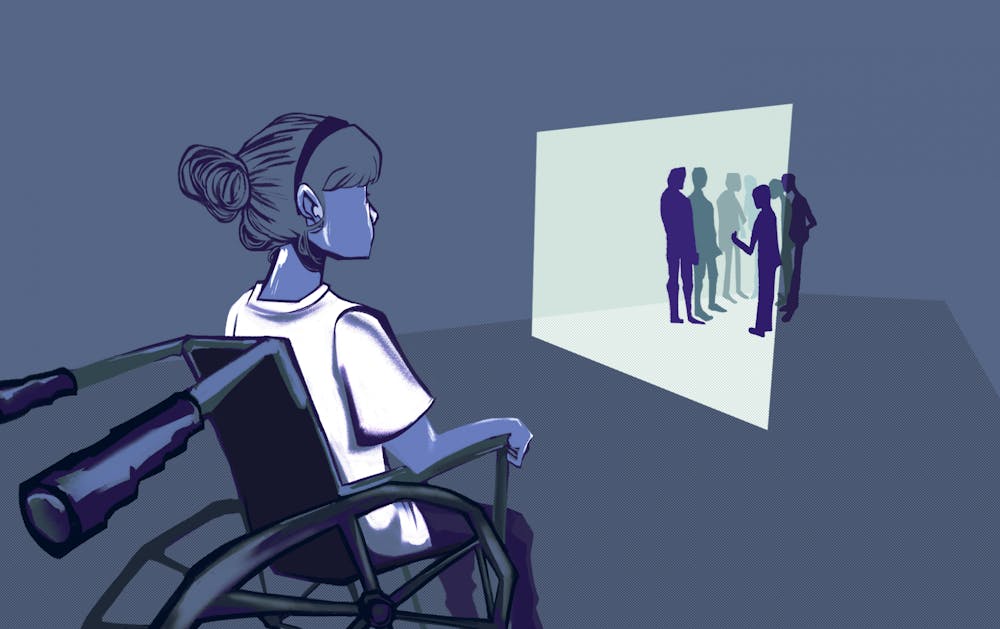As students began their fall semester at ASU, videos of parties surfaced on social media and ASU PD released several "student-related" party citations. Not long after these videos circulated, cases of COVID-19 began rising at ASU. Not only are these gatherings dangerous and irresponsible, they are also ableist.
While ASU students may not be throwing these celebrations to intentionally infect as many people as possible, they also aren't critically thinking about how their actions impact others.
ASU professor Terri Hlava, who teaches disability justice & advocacy within the School of Social Transformation, believes partying during the COVID-19 pandemic can be ableist. Hlava said that “ableist actions can be conscious and unconscious.”
She believes that students who party are thinking about what they want to do in the present moment, rather than thinking about the future.
While most young people who get COVID-19 will survive, this doesn’t mean every college-aged person or those who live in the surrounding community will respond the same way.
According to the CDC, at-risk people — typically the elderly and those with pre-existing medical conditions — are more likely than those not at-risk to become severely ill upon contracting the virus.
One argument I've seen is that because students are typically young and healthy, those at higher risk should simply stay locked down so that those who are less-at-risk can go out and live their lives.
This is ableist. The idea that a group of people shouldn’t leave their homes to do essential activities — because they have a disability or medical condition — is wrong and unrealistic.
According to UC Davis, nearly 30% of people with disabilities live below the poverty line, compared to 15% of the general population and 12% of the non-disabled population.
These people could be your cashier or bus driver — who cannot stay at home to work remotely.
If someone goes to a large gathering and then grabs takeout or rides the bus to class, they would be putting essential workers in the area at risk.
The people you interact with do not just include your family and friends. They also include the essential workers who provide you with food and transportation, among other services.
Transmission doesn't just impact people with physical disabilities. Many students with conditions like ADHD, dyslexia, autism, anxiety, or depression rely on the structure and organization they get from an in-person class.
Those who attend parties and then go to in-person classes risk infecting not only at-risk individuals who also attend class but also those with mental health conditions who have already been struggling to get through the pandemic.
Additionally, if classes end up switching completely online because of high infection rates, these same students likely won't be able to receive an education in the format that works best for them, meaning they may end up suffering academically and mentally.
For students who continue to participate in large gatherings, Hlava said to think about the reason you’re at ASU in the first place, “You’re at school to learn,” she said.
Hlava also suggested paying attention to the facts behind COVID-19, and how it can impact not just you, but your community.
“One of the things you might want to pay serious attention to is the science behind the spread. Even if you’re asymptomatic you can spread (the virus)," she said. "Think about your goals farther down the road, not just on a Saturday night. Think about why you’re at school. Think about what would happen if you got someone sick.”
Hlava advised getting an education in disability studies to combat ignorance and ableism. ASU’s School of Social Transformation has a plethora of classes on social justice, including some on disability studies and disability justice.
If you are a student with a disability who has been impacted by COVID-19, consider reaching out to the Student Accessibility and Inclusive Learning Services, formerly known as the Disability Resource Center. They can provide accommodations including extra time on exams, flexible deadlines, notetakers, and more.
If you are currently struggling with mental health or isolation, reach out to ASU Counseling for one-on-one appointments and support groups.
The next time you're about to go party or break social distancing, think about those around you.
Think about those with physical or mental disabilities who have struggled to stay physically and mentally healthy during this pandemic. Let’s make the right choices as a community.
Reach the columnist at htenore@asu.edu or follow @Haleyyhmt on Twitter.
Editor’s note: The opinions presented in this column are the author’s and do not imply any endorsement from The State Press or its editors.
Want to join the conversation? Send an email to opiniondesk.statepress@gmail.com. Keep letters under 500 words and be sure to include your university affiliation. Anonymity will not be granted.
Like The State Press on Facebook and follow @statepress on Twitter.

Haley Tenore is the editor of the State Press Opinion Desk. Tenore is also a digital reporter for Cronkite News and a co-president of the Accessibility Coalition. This is her fourth semester on the opinion desk and second semester as editor.




